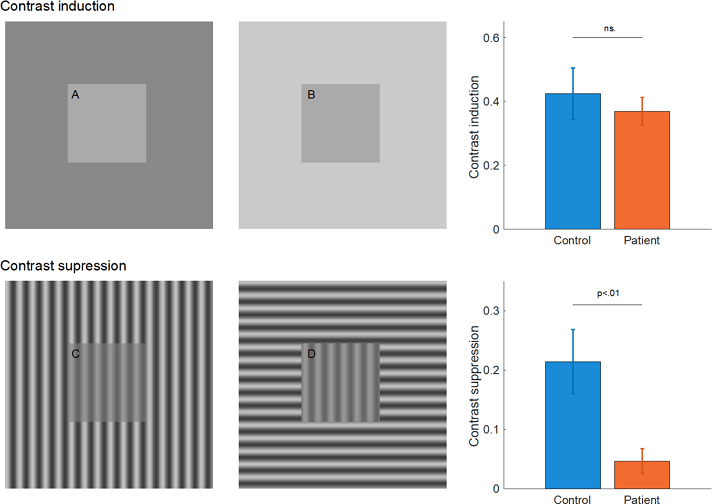Study: Depression affects visual perception … making it more accurate

The brightness of Figures A and B is exactly the same, but they are perceived differently due to a difference in the background. This illusion was perceived similarly by the patients and healthy control subjects. The contrast of Figures C and D is exactly the same as well, but the perception of this illusion was weaker among the depressed patients than the control subjects. (Salmela et al, J. Psychiatry Neurosci, 2021)
Depression affects visual perception (press release by University of Helsinki):
Researchers specialised in psychiatry and psychology at the University of Helsinki investigated the effects of depression on visual perception. The study confirmed that the processing of visual information is altered in depressed people, a phenomenon most likely linked with the processing of information in the cerebral cortex.
In the study, the processing of visual information by patients with depression was compared to that of a control group by utilising two visual tests. In the perception tests, the study subjects compared the brightness and contrast of simple patterns.
“What came as a surprise was that depressed patients perceived the contrast of the images shown differently from non-depressed individuals,” says Academy of Finland Research Fellow Viljami Salmela … “It would be beneficial to assess and further develop the usability of perception tests, as both research methods and potential ways of identifying disturbances of information processing in patients,” Salmela says.
Perception tests could, for example, serve as an additional tool when assessing the effect of various therapies as the treatment progresses.
The Study:
Reduced visual contrast suppression during major depressive episodes (Journal of Psychiatry and Neuroscience). Full study available Here (free, opens PDF). From the Abstract:
- Background: Previous studies have suggested that processing of visual contrast information could be altered in major depressive disorder. To clarify the changes at different levels of the visual hierarchy, we behaviourally measured contrast perception in 2 centre-surround conditions, assessing retinal and cortical processing.
- Methods: As part of a prospective cohort study, our sample consisted of controls (n = 29; 21 female) and patients with unipolar depression, bipolar disorder and borderline personality disorder who had baseline major depressive episodes (n = 111; 74 female). In a brightness induction test that assessed retinal processing, participants compared the perceived luminance of uniform patches (presented on a computer screen) as the luminance of the backgrounds was varied. In a contrast suppression test that assessed cortical processing, participants compared the perceived contrast of gratings, which were presented with collinearly or orthogonally oriented backgrounds.
- Results: Brightness induction was similar for patients with major depressive episodes and controls (p = 0.60, d = 0.115, Bayes factor = 3.9), but contrast suppression was significantly lower for patients than for controls (p < 0.006, d = 0.663, Bayes factor = 35.2). We observed no statistically significant associations between contrast suppression and age, sex, or medication or diagnostic subgroup. At follow-up (n = 74), we observed some normalization of contrast perception.
- Limitations: We assessed contrast perception using behavioural tests instead of electrophysiology.
The Study in Context:
- What do you see first, people or other animals?
- If you’re a fruit fly, tease your mind with this optical illusion. Humans welcome too.
- Three quick brain teaser games to test your perceptual and cognitive skills
- Test your Brain with these 10 Illusions
- Tease your brain with the Hermann Grid illusion


